长句的处理
同声传译译员经常遇到的问题

一、同声传译译员经常遇到的问题二、1、倒装句的处理英、汉语的语序差别很大,这就给口译造成了较大困难。
例如:Japan surrendered in 19 45 after Americans dropped two atom bombs。
同声传译时,往往是刚刚译出前半句"日本人在1945年投降了",接着又出现了后半句"美国人投了两颗原子弹后"。
在这种情况下,如果译员已按英文语序译出,只好把句子重新组合,再重复说一遍。
但这又显得翻译水平不高。
如何处理好呢?以下二种方法不妨试一试。
第一种:译员不要接得太紧,而是等讲话的人将大部分句子说出后,再开始翻译。
但是,在快速的同声传译中,往往等不了这样长的时间。
这样,我们可以采取第二种方法:将一个句子断为二、三个简单句,在简单句之间,适当补充一些字、词,把它们有机地联结起来。
上述例句可以译成:"日本人投降了,那是在1945年,在这之前,美国人投了两颗原子弹。
"这样译,虽然不完美,但是主要意思都译出来了,而且句子也比较通顺。
2、被动语态和主动语态英语常用被动语态,相对来说,汉语则多用主动语态。
了解这一点,在互译时,就会避免译出英文式的中文,或中文式的英文。
例如:In some of the European countries the people ar e given the biggest social benefit such as medical insu rance.此句英文用的是被动语态,翻译时应将其改为主动语态,译为:"在有些欧洲国家里,人民享受到最广泛的社会福利,如医疗保险等等。
"在同声传译时,由于时间紧迫,译员很容易顺着英文的句子结构往下译,译成"……人民被给予最大的社会福利……"。
仔细听国际会议的同声传译,就会发现不少译员经常犯这一通病。
因此,应当引起足够的重视。
翻译理论与实践[汉译英]汉译英-长句的处理
![翻译理论与实践[汉译英]汉译英-长句的处理](https://img.taocdn.com/s3/m/78a60c69f01dc281e53af0bd.png)
长句的处理Ⅰ. Put the following long sentences into English, paying attention to their structures.1.我厂生产的112升和145升电冰箱,造型美观,质量可靠,噪音小,耗电少,使用方便安全。
2.当前我们迫切需要有一个装备优良、人员齐备、按照安全保护原则、本着一丝不苟的精神建立起来的先进核能实验室。
3.本厂已有35年生产丝绸服装的历史,其产品远销全球50多个国家和地区。
完全真丝,质量上乘,做工精细,款式新颖,光滑柔和,耐洗耐晒,永不褪色,舒适高雅,女士必备。
如欲购买,尽快联系。
4.本厂产品质量稳定可靠,深受用户欢迎。
从1979年以来,获纺织部和省市奖的产品共达84种。
我们将遵循“质量第一”、“用户至上”的原则,热忱地为用户服务。
5.知识分子是工人阶级中掌握科学文化知识较多的一部分,在改革开放和现代化建设中有着特殊重要的作用。
能不能充分发挥广大知识分子的才能,很大程度上决定着我们民族的盛衰和现代化建设的进程。
6.历史业也已证明,人类对资源的认识、开发和利用的,以及制造生产工具利用资源的能力,是社会生产力发展水平的重要标志,也在一定的程度上决定了一定的社会基本结构和发展形态。
7.信息技术是在微电子、计算机和现代通讯技术基础上发展起来的一门高科技,具有信息采集、传输、处理和信息服务等一系列功能。
现今已能在一片8英寸的芯片上集成5亿个电子元件,其宽度仅为0.2503微米;微机的信息处理速度已达每秒近亿次以上;计算机虚拟技术将大大拓宽信息技术应用的范围。
8.提高我国的科技水平,必须坚持独立自主、自力更生的方针。
但是,独立自主不是闭关自守,自力更生不是盲目排外。
科学技术是人类共同创造的财富。
我们不仅因为今天科技落后才需要向外股学习,即使我们的科学技术赶上了世界先进水平,也还要学习人家的长处。
Key: 1.将“造型美观,质量可靠,噪音小,耗电少,使用方便安全”用一个主谓结构译出。
Division (长句 的处理)2

四十年来,武汉杂技在继承了传统杂技的基础上,大胆吸收其 他姊妹艺术之长,运用多种艺术手段将布景、灯光、服装、道 具、美术为一体,使杂技表演成为综合性的表演艺术。
For 40 years, based on traditional acrobatics technique, Wuhan acrobatics has absorbed bravely the strong points of other sister arts and mixed together scenery, lighting, costume and fine arts, by using all kinds of artistic methods so that the acrobatic performance becomes a comprehensive art of performance.
Division (长句 的处理)
Division, as a translation technique, means the necessary splitting of a long sentence into shorter ones. To split a sentence at will is definitely a mistake in translation, for this is bound to mar the style, or even the meaning of the original. But that does not mean “splitting the sentence” is absolutely impermissible. On the principle of “subordinating the part to the whole”, a translator may, through a careful analysis of the context, split a long and involved sentence properly in translation, so as to convey faithfully the thought of the original in a readable way.
常见病句类型及修改方法句子结构混乱的处理技巧

常见病句类型及修改方法句子结构混乱的处理技巧句子结构的混乱是写作中常见的问题之一。
一个句子如果结构混乱,不仅会影响读者的理解,也会削弱文章的可读性和逻辑性。
本文将介绍一些常见的病句类型,并提供修改方法来处理句子结构混乱的困扰。
一、长句缺乏主谓宾结构长句的使用可以丰富文章的表达,但如果长句缺乏明确的主谓宾结构,就会使句子的意思变得模糊。
解决这个问题的方法是将长句拆分成短句,并明确主谓宾的关系。
例如,原句:“因为昨天下了一场大雨,我今天坐车去上班。
”修改后:“昨天下了一场大雨。
今天,我坐车去上班。
”二、并列句过多造成混乱过多使用并列句会导致句子结构的混乱,读者很难理解句子的主次关系。
要解决这个问题,可以使用连接词或分号来明确并列句之间的关系,或者将并列句改写为复合句。
例如,原句:“他出去散步,买东西,去图书馆。
”修改后:“他出去散步,买东西,还去了图书馆。
”三、主谓宾结构过于简单过于简单的主谓宾结构会使文章显得平淡无味,缺乏变化。
为了使句子更富有表达力,可以通过增加定语、状语等来丰富主谓宾结构。
例如,原句:“他喝咖啡。
”修改后:“他喝着香气扑鼻的咖啡。
”四、定语从句使用不当定语从句是修饰名词的重要结构,但如果使用不当,会导致句子结构的混乱。
为了避免这个问题,应该明确定语从句和主句之间的关系,避免过长或过复杂的定语从句。
例如,原句:“去年买的书,书店关门了。
”修改后:“去年买的书在书店关门之前都还是很畅销的。
”五、动词时态错误动词时态错误会导致句子结构混乱,给读者造成阅读困扰。
为了解决这个问题,需要确保动词时态与上下文的逻辑关系一致。
例如,原句:“他昨天告诉我他明天去旅行。
”修改后:“他昨天告诉我他将要去旅行。
”六、句子成分重复句子中的重复成分会使句子结构混乱,令读者感到困惑。
解决这个问题的方法是删除或重新安排重复的句子成分,使句子更加流畅。
例如,原句:“我刚才刚才给他打了一个电话。
”修改后:“我刚才给他打了一个电话。
长句的处理(1)
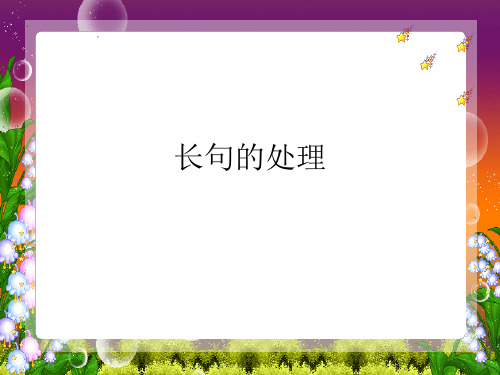
• A World Bank report released at the time of the conference, which ended on 10 December, insists that Vietnam’s overall growth will depend more on its own policies than on the volume of external financing.
• A World Bank report…insists that…; • …released at the time of the conference; • Which ended on December; • Vietnam’s overall growth will depend more
• 在12月10日结束的巴黎会议上披露的世界 银行的一份报告反复强调越南经济的全面 增长将更主要地取决于其本国的政策,而 不是外来资金的数额。
• 在12月10日结束的巴黎会议上,披露的世 界银行的一份报告。报告反复强调越南经 济的全面增长将更主要地取决于其本国的 政策,而不是外来资金的数额。
• Human history began when the inheritance of genetics and behavior which had until then provided the only way of dominating the environment was first broken through by conscious choice.
• 这种想法……简直令人难以置信; • 鱼能发电; • 电的强度足以点亮灯泡; • 甚至足以开动马达。
• 那种认为鱼能发出强度大到能点亮灯泡甚 至开动马达的电的想法是令人难以置信的。
六年级上册阅读易错点、难点的突破方法
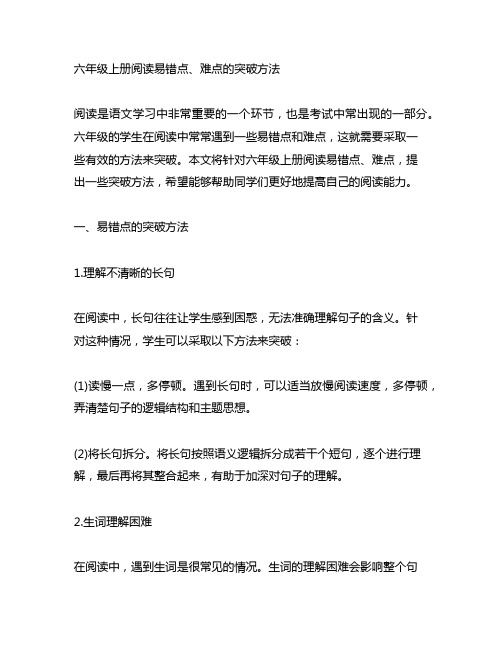
六年级上册阅读易错点、难点的突破方法阅读是语文学习中非常重要的一个环节,也是考试中常出现的一部分。
六年级的学生在阅读中常常遇到一些易错点和难点,这就需要采取一些有效的方法来突破。
本文将针对六年级上册阅读易错点、难点,提出一些突破方法,希望能够帮助同学们更好地提高自己的阅读能力。
一、易错点的突破方法1.理解不清晰的长句在阅读中,长句往往让学生感到困惑,无法准确理解句子的含义。
针对这种情况,学生可以采取以下方法来突破:(1)读慢一点,多停顿。
遇到长句时,可以适当放慢阅读速度,多停顿,弄清楚句子的逻辑结构和主题思想。
(2)将长句拆分。
将长句按照语义逻辑拆分成若干个短句,逐个进行理解,最后再将其整合起来,有助于加深对句子的理解。
2.生词理解困难在阅读中,遇到生词是很常见的情况。
生词的理解困难会影响整个句子甚至整篇文章的理解。
针对这种情况,学生可以采取以下方法来突破:(1)上下文推测法。
通过上下文的语境,推测生词的意思。
有时候,文章中会出现解释性的语句,有时候可以从前后句的逻辑关系中推断生词的含义。
(2)查字典。
遇到生词时,可以及时使用词典查找生词的含义,加深理解。
3.篇章结构理解不清有时候,整篇文章的篇章结构会影响学生对文章的整体理解。
针对这种情况,学生可以采取以下方法来突破:(1)抓住文章的主题句。
主题句通常在文章的开头或结尾,它包含了整篇文章的中心思想,抓住主题句能够帮助学生更好地理解文章。
(2)掌握文章的中心思想。
在阅读中,关注文章的中心思想和重要论据,有助于学生把握文章的主要内容和结构。
二、难点的突破方法1.推理判断题在阅读理解题中,推理判断题往往是学生的难点,需要学生有一定的逻辑推理能力。
针对这种情况,学生可以采取以下方法来突破:(1)仔细审题。
在做推理判断题时,学生要仔细审题,理清题目中的逻辑关系,准确把握题目的要求。
(2)利用上下文线索。
在解决推理判断题时,可以通过文章的上下文线索,进行逻辑推理,找出正确答案。
机器翻译中的长句处理与实时性优化研究

机器翻译中的长句处理与实时性优化研究随着全球化进程的加速和跨语言交流的不断增多,机器翻译作为一种快速、高效的语言转换工具,正逐渐成为重要的研究领域。
然而,机器翻译系统在面对长句时往往会出现一些挑战,例如词序错误、语法结构不通顺等。
本文将探讨机器翻译中长句处理的问题,并研究如何优化实时性能。
从语言学的角度来看,长句的特点是句法结构复杂、包含大量的从句和修饰成分。
当机器翻译系统处理长句时,很容易出现语法错误或语义偏离的情况。
传统的基于规则的机器翻译方法往往无法处理这种复杂结构,而基于统计的机器翻译方法在面对长句时也面临困难。
因此,研究者们开始探索新的方法来解决这一问题。
近年来,神经网络机器翻译(NMT)在处理长句方面取得了显著的进展。
NMT将翻译任务转化为一个端到端的序列转换问题,通过学习大规模的双语平行语料库,可以更好地捕捉长句的上下文信息,从而提高翻译质量。
此外,还有一些针对长句处理的改进方法被提出,如引入目标语词语序列的自适应长度限制和基于语言模型的长度惩罚机制等。
这些方法在一定程度上改善了长句翻译的质量,但同时也增加了系统的计算复杂性。
除了翻译质量的问题,长句处理还会对机器翻译系统的实时性能产生影响。
由于长句的句法结构复杂,处理时间往往会很长,导致系统响应变慢。
为了解决这一问题,有研究者提出了一些方法来优化实时性能。
例如,可以采用分段翻译的策略,将长句切分为若干个较短的子句进行翻译,然后将各个子句的翻译结果组合起来。
此外,还可以利用多线程或分布式计算的方式来并行处理长句,提高系统的响应速度。
除了以上方法,还有一些其他的优化策略可以应用于长句处理。
例如,可以进行深度学习模型的剪枝和压缩,减小模型的规模,从而提高翻译速度。
此外,可以利用预训练的语言模型来提供更准确的上下文信息,提高翻译质量。
另外,还可以使用知识图谱等外部资源来辅助长句处理。
在实际应用中,长句处理和实时性优化是机器翻译系统必须面对的挑战。
注意安排好长句子中间的停顿
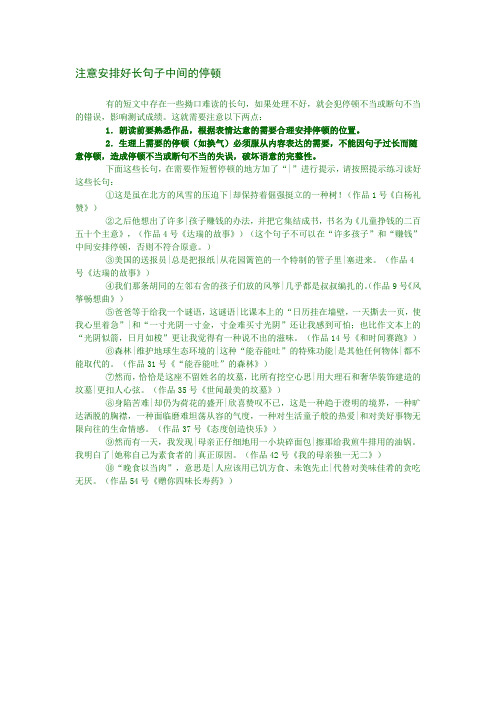
注意安排好长句子中间的停顿有的短文中存在一些拗口难读的长句,如果处理不好,就会犯停顿不当或断句不当的错误,影响测试成绩。
这就需要注意以下两点:1.朗读前要熟悉作品,根据表情达意的需要合理安排停顿的位置。
2.生理上需要的停顿(如换气)必须服从内容表达的需要,不能因句子过长而随意停顿,造成停顿不当或断句不当的失误,破坏语意的完整性。
下面这些长句,在需要作短暂停顿的地方加了“|”进行提示,请按照提示练习读好这些长句:①这是虽在北方的风雪的压迫下|却保持着倔强挺立的一种树!(作品1号《白杨礼赞》)②之后他想出了许多|孩子赚钱的办法,并把它集结成书,书名为《儿童挣钱的二百五十个主意》,(作品4号《达瑞的故事》)(这个句子不可以在“许多孩子”和“赚钱”中间安排停顿,否则不符合原意。
)③美国的送报员|总是把报纸|从花园篱笆的一个特制的管子里|塞进来。
(作品4号《达瑞的故事》)④我们那条胡同的左邻右舍的孩子们放的风筝|几乎都是叔叔编扎的。
(作品9号《风筝畅想曲》)⑤爸爸等于给我一个谜语,这谜语|比课本上的“日历挂在墙壁,一天撕去一页,使我心里着急”|和“一寸光阴一寸金,寸金难买寸光阴”还让我感到可怕;也比作文本上的“光阴似箭,日月如梭”更让我觉得有一种说不出的滋味。
(作品14号《和时间赛跑》)⑥森林|维护地球生态环境的|这种“能吞能吐”的特殊功能|是其他任何物体|都不能取代的。
(作品31号《“能吞能吐”的森林》)⑦然而,恰恰是这座不留姓名的坟墓,比所有挖空心思|用大理石和奢华装饰建造的坟墓|更扣人心弦。
(作品35号《世闻最美的坟墓》)⑧身陷苦难|却仍为荷花的盛开|欣喜赞叹不已,这是一种趋于澄明的境界,一种旷达洒脱的胸襟,一种面临磨难坦荡从容的气度,一种对生活童子般的热爱|和对美好事物无限向往的生命情感。
(作品37号《态度创造快乐》)⑨然而有一天,我发现|母亲正仔细地用一小块碎面包|擦那给我煎牛排用的油锅。
我明白了|她称自己为素食者的|真正原因。
公文写作中如何处理长篇幅和冗长表达

公文写作中如何处理长篇幅和冗长表达在公文写作中,长篇幅和冗长表达往往会浪费读者的时间和精力,影响阅读的效果和体验。
因此,我们需要运用一些技巧来处理长篇幅和冗长表达,使公文更加简洁明了。
本文将从以下几个方面来探讨如何处理这些问题。
1. 删除冗余信息在写作过程中,我们常常会使用一些不必要的修辞和描绘,导致文章变得冗长。
因此,我们需要仔细审查并删除冗余信息。
例如,可以删除重复的信息、无关紧要的细节,以及不必要的修饰语。
确保每一个词语都有明确的含义和作用,避免文章臃肿和冗长。
2. 使用简洁的句子结构长句和复杂的句子结构会给读者造成阅读的困扰,同时也容易使文章变得冗长。
因此,我们应该采用简洁的句子结构,避免嵌套过多的子句和修饰语。
保持句子的主谓宾结构,尽量用简单直接的表达方式来呈现观点和信息,使读者能够更轻松地理解和领会。
此外,使用积极的语态,避免繁琐的被动语态,也是简洁表达的一种方式。
3. 分段落论述将长篇幅的公文分成段落,能够使文章结构更加清晰有序,方便读者阅读和理解。
每一段应该围绕一个主题或一个观点展开论述,同时使用合适的过渡词来连接各个段落。
避免一个段落过长而导致读者难以抓住关键信息,也避免多个不相关的观点在同一个段落中混淆。
4. 使用清晰明了的表达方式在公文写作中,我们应该使用简单明了、直接有效的表达方式来传递信息和观点。
避免使用复杂的词汇和术语,除非确实必要。
使用具体明确的词语和短语,避免使用含糊不清或模棱两可的表达方式。
使用简洁精炼的语言,尽量避免冗长的句子和重复的表述。
5. 编写简明扼要的标题和摘要一个清晰简明的标题和摘要可以帮助读者迅速了解文章的主题和核心内容。
标题要能准确概括文章的主题,摘要则要简明扼要地介绍文章的主要观点和结论。
避免使用过长和不具体的标题,也不要在摘要中展开过多的内容,保持标题和摘要的简洁性和精准性。
在公文写作中,我们需要注重对长篇幅和冗长表达的处理。
通过删除冗余信息、使用简洁的句子结构、分段落论述、使用清晰明了的表达方式以及编写简明扼要的标题和摘要,我们可以提高公文的可读性和可理解性,使公文更加简洁明了,更好地满足读者的需求。
仲伟合《英语口译教程(下)》学习辅导书(同声传译的应对策略)【圣才出品】
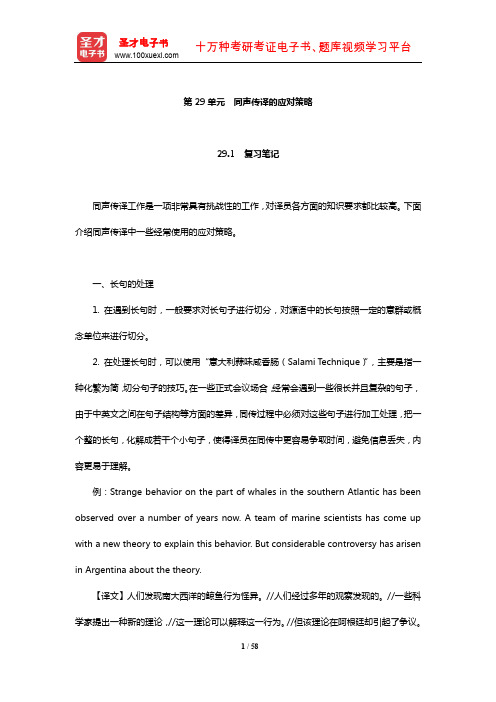
第29单元同声传译的应对策略29.1 复习笔记同声传译工作是一项非常具有挑战性的工作,对译员各方面的知识要求都比较高。
下面介绍同声传译中一些经常使用的应对策略。
一、长句的处理1. 在遇到长句时,一般要求对长句子进行切分,对源语中的长句按照一定的意群或概念单位来进行切分。
2. 在处理长句时,可以使用“意大利蒜味咸香肠(Salami Technique)”,主要是指一种化繁为简,切分句子的技巧。
在一些正式会议场合,经常会遇到一些很长并且复杂的句子,由于中英文之间在句子结构等方面的差异,同传过程中必须对这些句子进行加工处理,把一个整的长句,化解成若干个小句子,使得译员在同传中更容易争取时间,避免信息丢失,内容更易于理解。
例:Strange behavior on the part of whales in the southern Atlantic has been observed over a number of years now. A team of marine scientists has come up with a new theory to explain this behavior. But considerable controversy has arisen in Argentina about the theory.【译文】人们发现南大西洋的鲸鱼行为怪异。
//人们经过多年的观察发现的。
//一些科学家提出一种新的理论,//这一理论可以解释这一行为。
//但该理论在阿根廷却引起了争议。
3. 处理长句还要学会使用“润滑剂”。
由于在同声传译时,为了赶时间,译员往往尽可能依照原文的句法结构,即前面介绍的“顺句驱动”方法,避免做大的改动。
当把长句切为短句时,难免会造成一种断断续续、互不关联的感觉。
因此,在短句之间,要灵活地添加一些虚词。
这些词本身不具有任何意义,但却能使译出的句子听起来不那么艰涩、生硬。
英语长句的处理与译法

o 【 ywod ]n lh;o gs ne c s Prc s ; a sainmeh d Ke rsE gi L n.e tn e ; o e sTrn lt t o s s
.
1 英 语 长 旬 的 处 理
英语 多以长句为主 , 用连词 、 词 、 词短语和有关 系代词 、 常 介 分 关 说 . 成 长 句 的原 因主 要 有 修 饰 语 过 多 , 列 成 分 多 ,语 言 结 构 层 次 造 并
说 刚才 第 一 , 步 是 翻 译 中 的理 清 层 次 , 么 这 第 三 , , 步 是 表 达 内容 的叙 述 层 次 与 汉语 基 本 一致 时 , 以 按 照 英 语 可 原 文 的顺 序 翻译 成 汉 语 。例 如 :
Bu o ti e ie h ts p le fsmeo h m r i td, n tn w i sra z dta u piso o ft e aelmie a d l i i v np sil ogv e s n be etmaeo h i “ x e tto f t se e o sbe t iea rao a l si t fter e p cain o
之 间的语法关系和逻辑关系 , 从整体上理解长句 。 即对原文 的理解, 要 该 句 的骨 干 结 构 为 “ s ele ht ”i为 形 式 主 语 , a 引 导 Ii rai dta… , t z t tt h 从 整 体 出发 , 入 到 细 节, 回到 整 体 。上 面 的那 个 例 子 中 的 句 子 主 干 深 再 着 主语 从 句 以 及 并 列 的 ii ee os l t s vnpsi et 结 构 , 中 , 定 式 作 b o… 其 不 虽 然 简 单 。后 面 的 时 间 状语 从 句 却 比较 复 杂 ,该 从 句 的主 干 是 H ma u n 主 语 。 et e… 是 “x ett no f” 同 位 语 , 一 步解 释 其 含 义 , h i t m ep ca o fi 的 i le 进 hs r ea 。h n 引 导 的 状 语 从 句 teihr ac fgnt sad ioy bg w e t n h n e tne o eei n i c 而t i me后 面 的句 子 是 它 的 定 语 从 句 。五 个 谓 语 结 构 , 达 了 四个 层 次 表 bh vo a mt r—kntru hb ea i w s o e og y… 主 语 后 又 接 了一 个 定 语 从 句 r i f b h 的 意义 : . 是 现 在 人 们 意 识 到 ; . 中有 些 矿 物 质 的 蕴 藏 量 是 有 A可 B其 wh c h d u t t e p o i e t e o l wa o d mi a i g t e ih a ni h n rvd d h ny l y f o n tn h 限 的 :C 人 们 甚 至 还 可 以 比 较合 理 的估 计 出这 些 矿 物 质 “ 望 存 在 多 . 可 e io me twa rtb k n t r u h b o s i u h ief nvr n n sf s r e h o g y c n co s c o c .P i o 少 年 ” . 这些 已知 矿 源 和 储 量 将 消 耗 殆尽 的 时 间 。根 据 同位 语 从 :D 将 “ 削枝 去 蔓 , 出 主 干 ; 分 缕 析 , 找 条 理清 关 系 ” 只 是 我 们 在 进 行 英 这 句 的 翻译 方 法 . 第 四层 意义 的 表 达 作 适 当 的 调整 , 个 句 子 就 翻译 把 整 语 长句 处 理 时 的第 一 二 两 步 , 完 成 这 两 步后 , 清 层 次 。 们 接 着 要 在 理 我 为: . 进 行 第 三 步 : 定 单 位 , 个 击 破彳 这 过 程 中 我 们 要 先 确 定 翻 译 单 确 各 在 可 是 现 在 人 们 意 识 到 。 中 有 些 矿 物 质 的 蕴 藏 量 是 有 限 的 , 们 其 人 位 , 逐 次转 换 成 汉 语 。翻译 时 通 常 可把 小 句 当作 最 佳 转 换 单 位 , 英 再 将 甚 至还 可 以 比较 合 理 的估 计 出 这些 矿 物质 “ 望 存 在 多 少 年 ” 也 就 是 可 , 语 长 句 拆 分 成 一个 个 相 对 独 立 的 小 句 。再 分 别 转 换 成 相 应 的 汉 语 小 说 . 过若 干年 后 . 些 矿 物 的 全部 已 知矿 源 和储 量 将 消 耗 殆 尽 。 经 这 句 o[ 例 如 : 2 1 p
句子太长读着喘不上气朗读中应该如何停顿
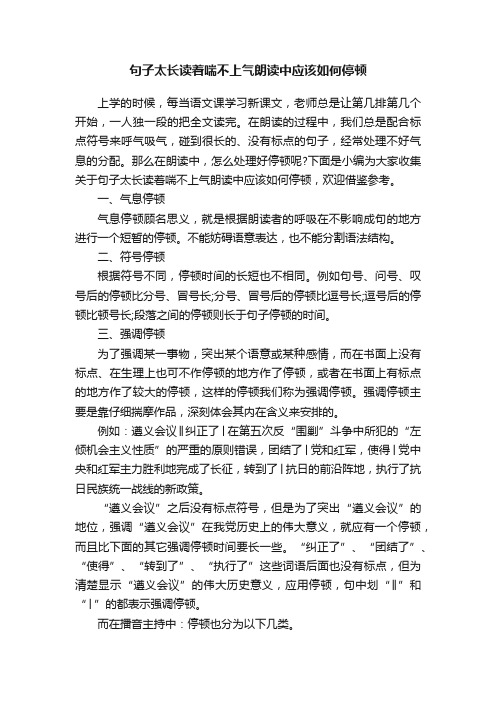
句子太长读着喘不上气朗读中应该如何停顿上学的时候,每当语文课学习新课文,老师总是让第几排第几个开始,一人独一段的把全文读完。
在朗读的过程中,我们总是配合标点符号来呼气吸气,碰到很长的、没有标点的句子,经常处理不好气息的分配。
那么在朗读中,怎么处理好停顿呢?下面是小编为大家收集关于句子太长读着喘不上气朗读中应该如何停顿,欢迎借鉴参考。
一、气息停顿气息停顿顾名思义,就是根据朗读者的呼吸在不影响成句的地方进行一个短暂的停顿。
不能妨碍语意表达,也不能分割语法结构。
二、符号停顿根据符号不同,停顿时间的长短也不相同。
例如句号、问号、叹号后的停顿比分号、冒号长;分号、冒号后的停顿比逗号长;逗号后的停顿比顿号长;段落之间的停顿则长于句子停顿的时间。
三、强调停顿为了强调某一事物,突出某个语意或某种感情,而在书面上没有标点、在生理上也可不作停顿的地方作了停顿,或者在书面上有标点的地方作了较大的停顿,这样的停顿我们称为强调停顿。
强调停顿主要是靠仔细揣摩作品,深刻体会其内在含义来安排的。
例如:遵义会议║纠正了│在第五次反“围剿”斗争中所犯的“左倾机会主义性质”的严重的原则错误,团结了│党和红军,使得│党中央和红军主力胜利地完成了长征,转到了│抗日的前沿阵地,执行了抗日民族统一战线的新政策。
“遵义会议”之后没有标点符号,但是为了突出“遵义会议”的地位,强调“遵义会议”在我党历史上的伟大意义,就应有一个停顿,而且比下面的其它强调停顿时间要长一些。
“纠正了”、“团结了”、“使得”、“转到了”、“执行了”这些词语后面也没有标点,但为清楚显示“遵义会议”的伟大历史意义,应用停顿,句中划“║”和“│”的都表示强调停顿。
而在播音主持中:停顿也分为以下几类。
一、生理停顿生理停顿是指表达者根据自身气息的需要,在表达过程中,在不影响语义完整的地方,做一个短暂的停歇或换气。
需要注意的是:生理停顿,不要妨碍语意表达,也不可割裂语法结构。
例如:“在建设工作中,犯一些错误,有一些缺点,是难免的。
高考英语阅读理解长难句分析详解
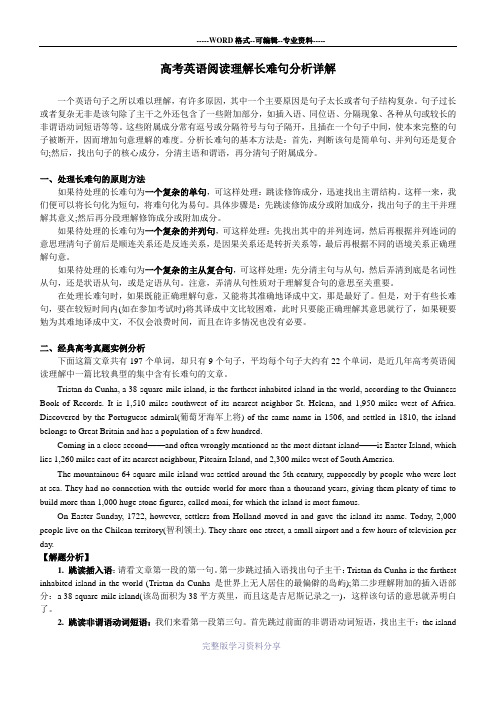
高考英语阅读理解长难句分析详解一个英语句子之所以难以理解,有许多原因,其中一个主要原因是句子太长或者句子结构复杂。
句子过长或者复杂无非是该句除了主干之外还包含了一些附加部分,如插入语、同位语、分隔现象、各种从句或较长的非谓语动词短语等等。
这些附属成分常有逗号或分隔符号与句子隔开,且插在一个句子中间,使本来完整的句子被断开,因而增加句意理解的难度。
分析长难句的基本方法是:首先,判断该句是简单句、并列句还是复合句;然后,找出句子的核心成分,分清主语和谓语,再分清句子附属成分。
一、处理长难句的原则方法如果待处理的长难句为一个复杂的单句,可这样处理:跳读修饰成分,迅速找出主谓结构。
这样一来,我们便可以将长句化为短句,将难句化为易句。
具体步骤是:先跳读修饰成分或附加成分,找出句子的主干并理解其意义;然后再分段理解修饰成分或附加成分。
如果待处理的长难句为一个复杂的并列句,可这样处理:先找出其中的并列连词,然后再根据并列连词的意思理清句子前后是顺连关系还是反连关系,是因果关系还是转折关系等,最后再根据不同的语境关系正确理解句意。
如果待处理的长难句为一个复杂的主从复合句,可这样处理:先分清主句与从句,然后弄清到底是名词性从句,还是状语从句,或是定语从句。
注意,弄清从句性质对于理解复合句的意思至关重要。
在处理长难句时,如果既能正确理解句意,又能将其准确地译成中文,那是最好了。
但是,对于有些长难句,要在较短时间内(如在参加考试时)将其译成中文比较困难,此时只要能正确理解其意思就行了,如果硬要勉为其难地译成中文,不仅会浪费时间,而且在许多情况也没有必要。
二、经典高考真题实例分析下面这篇文章共有197个单词,却只有9个句子,平均每个句子大约有22个单词,是近几年高考英语阅读理解中一篇比较典型的集中含有长难句的文章。
Tristan da Cunha, a 38-square-mile island, is the farthest inhabited island in the world, according to the Guinness Book of Records. It is 1,510 miles southwest of its nearest neighbor St. Helena, and 1,950 miles west of Africa. Discovered by the Portuguese admiral(葡萄牙海军上将) of the same name in 1506, and settled in 1810, the island belongs to Great Britain and has a population of a few hundred.Coming in a close second——and often wrongly mentioned as the most distant island——is Easter Island, which lies 1,260 miles east of its nearest neighbour, Pitcairn Island, and 2,300 miles west of South America.The mountainous 64-square-mile island was settled around the 5th century, supposedly by people who were lost at sea. They had no connection with the outside world for more than a thousand years, giving them plenty of time to build more than 1,000 huge stone figures, called moai, for which the island is most famous.On Easter Sunday, 1722, however, settlers from Holland moved in and gave the island its name. Today, 2,000 people live on the Chilean territory(智利领土). They share one street, a small airport and a few hours of television per day.【解题分析】1. 跳读插入语:请看文章第一段的第一句。
阅读过程中处理难句长句的技能方法(一)

阅读过程中处理难句长句的技能方法(一)每一段文字都有一个中心思想,都包含(或显或隐)一句表达该中心思想的“主题句”。
对于理解一个段落来说,正确理解主题句是十分重要和关键的。
有时在一段文字中,除去主题句以外的内容全都是对主题句的论点进行支持的论据。
有经验的阅读者可以不必逐字逐句读完全段便可以了解其中心思想,而技能差的学生一字一句地读完该段尚对其中心思想茫然不知。
除了主题句以外,在文章中还常常存在一些关键句子,表达了被描述事情发展的关键阶段,或性质的突然转变等。
往往对一段文字的正确理解要基于对这些句子的正确理解。
阅读者要学会如何发现和鉴别这些句子,正确地理解他们,发掘其内含的意义。
这样,对提高阅读速度和提高阅读效率就起到了事半功倍的作用。
因此,除了词汇的因素,句子也是影响阅读成功的一个主要因素。
通常情况下,造成句子难以理解原因主要是:词汇多重意义,语法结构复杂,句子过长等。
学生在遇到这样的困难句子时,首先要弄清楚是什么原因造成的。
当句子难以理解而主要原因是词汇时,可以首先考虑把生词去掉,看看去掉生词是否影响读懂全句。
例如:TheWesthadsentarmiestocap-tureandholdJerusalem;insteadtheythem-selvesfelvictimtoahostofnewideasandsubtleinfluenceswhichlefttheirmarkonthedevelopmentofEuropeanliterature,chivalry,warfare,sanitation,commerce,politicalinstitu-tions,medicineandthepapacyitself.假设句子中划线的词和词组都是陌生词汇。
学生可以试着读划掉他们以后的句子。
尽管新句子在语法上可能有所欠缺,但在整体意义上是完整的。
这些生词占据的位置属于修饰、说明部分,去掉后并不影响全句意义。
英译汉7-句子翻译(1)长句处理
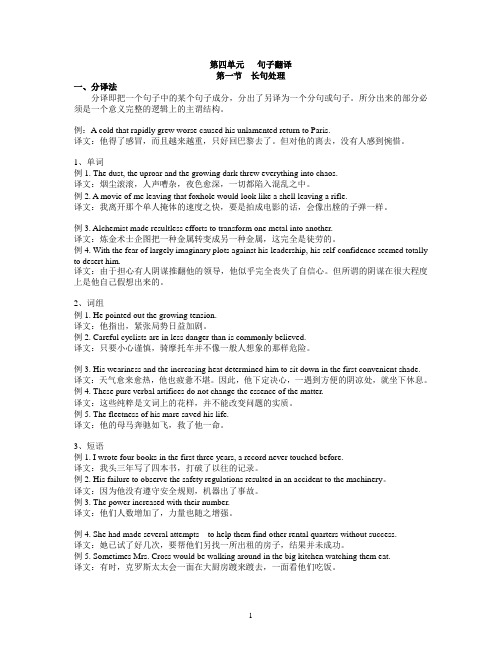
第四单元句子翻译第一节长句处理一、分译法分译即把一个句子中的某个句子成分,分出了另译为一个分句或句子。
所分出来的部分必须是一个意义完整的逻辑上的主谓结构。
例:A cold that rapidly grew worse caused his unlamented return to Paris.译文:他得了感冒,而且越来越重,只好回巴黎去了。
但对他的离去,没有人感到惋惜。
1、单词例1. The dust, the uproar and the growing dark threw everything into chaos.译文:烟尘滚滚,人声嘈杂,夜色愈深,一切都陷入混乱之中。
例2. A movie of me leaving that foxhole would look like a shell leaving a rifle.译文:我离开那个单人掩体的速度之快,要是拍成电影的话,会像出膛的子弹一样。
例3. Alchemist made resultless efforts to transform one metal into another.译文:炼金术士企图把一种金属转变成另一种金属,这完全是徒劳的。
例4. With the fear of largely imaginary plots against his leadership, his self-confidence seemed totally to desert him.译文:由于担心有人阴谋推翻他的领导,他似乎完全丧失了自信心。
但所谓的阴谋在很大程度上是他自己假想出来的。
2、词组例1. He pointed out the growing tension.译文:他指出,紧张局势日益加剧。
例2. Careful cyclists are in less danger than is commonly believed.译文:只要小心谨慎,骑摩托车并不像一般人想象的那样危险。
公文写作中如何处理长句和复杂句式

公文写作中如何处理长句和复杂句式公文写作一般要求语句精炼、简练,表达准确、清晰。
然而,在实际写作过程中,由于内容复杂或思路繁杂,难免会产生长句和复杂句式。
如何处理这样的句子,以保证公文的质量和可读性?本文将就公文写作中处理长句和复杂句式的方法进行探讨。
一、切分长句长句常常由多个分句组成,在公文写作中,过长的句子容易让读者产生困扰,理解起来也较为困难。
因此,我们可以通过以下几种方法来切分长句,使其更易于理解。
1.通过标点切分:适当运用标点符号,如逗号、分号等,将长句分割为几个并列或从属关系的短句。
例如:原句:根据会议讨论情况,我们决定加强对职工的培训和技能提升。
切分后:根据会议讨论情况,我们决定加强对职工的培训,同时加强职工的技能提升。
2.通过连接词切分:利用适当的连接词,如并列连词“并且”、“或者”,从属连词“因为”、“尽管”等,将复杂的长句分为两个或多个简洁明了的句子。
例如:原句:这项工作虽然复杂,但只要我们一点点地去做,并且加强团队合作,就一定能够取得成功。
切分后:这项工作虽然复杂,但只要我们一点点地去做。
并且我们还需要加强团队合作。
相信只要我们坚持下去,一定能够取得成功。
二、减少修饰语公文写作中,长句往往与过多的修饰语有关。
过多的修饰语容易使句子拖沓、晦涩,给读者造成阅读困难。
因此,我们需要注意减少修饰语的使用,使句子更加简明扼要。
1.简化修饰语:对于复合句中的修饰语,我们可以适当简化其表达方式。
例如:原句:根据我部门丰富的实践经验,我们认为这种方案是行之有效的。
简化后:根据我部门的实践经验,我们认为这种方案是行之有效的。
2.删除冗余修饰语:有时,我们会在句子中使用类似“实际上”、“无疑地”等修饰语,这些修饰语并没有实际意义,只会增加句子的冗长度。
因此,我们可以删去这些冗余修饰语,使句子更为简洁。
例如:原句:实际上,我们已经取得了显著的成绩。
改为:我们已经取得了显著的成绩。
三、运用并列句并列句是指两个或多个具有相同地位的分句通过并列连词连接在一起的句子。
公文写作中如何处理长句和复杂句
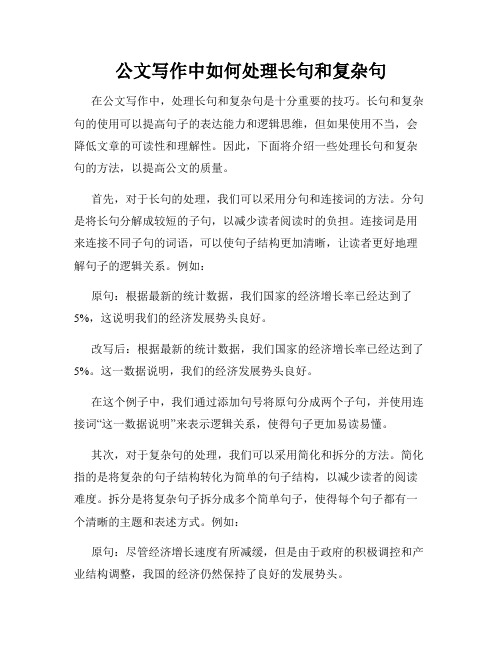
公文写作中如何处理长句和复杂句在公文写作中,处理长句和复杂句是十分重要的技巧。
长句和复杂句的使用可以提高句子的表达能力和逻辑思维,但如果使用不当,会降低文章的可读性和理解性。
因此,下面将介绍一些处理长句和复杂句的方法,以提高公文的质量。
首先,对于长句的处理,我们可以采用分句和连接词的方法。
分句是将长句分解成较短的子句,以减少读者阅读时的负担。
连接词是用来连接不同子句的词语,可以使句子结构更加清晰,让读者更好地理解句子的逻辑关系。
例如:原句:根据最新的统计数据,我们国家的经济增长率已经达到了5%,这说明我们的经济发展势头良好。
改写后:根据最新的统计数据,我们国家的经济增长率已经达到了5%。
这一数据说明,我们的经济发展势头良好。
在这个例子中,我们通过添加句号将原句分成两个子句,并使用连接词“这一数据说明”来表示逻辑关系,使得句子更加易读易懂。
其次,对于复杂句的处理,我们可以采用简化和拆分的方法。
简化指的是将复杂的句子结构转化为简单的句子结构,以减少读者的阅读难度。
拆分是将复杂句子拆分成多个简单句子,使得每个句子都有一个清晰的主题和表述方式。
例如:原句:尽管经济增长速度有所减缓,但是由于政府的积极调控和产业结构调整,我国的经济仍然保持了良好的发展势头。
改写后:尽管经济增长速度有所减缓,但政府的积极调控和产业结构调整使我国的经济保持了良好的发展势头。
在这个例子中,我们通过去掉“由于”和“仍然”,以及对句子结构进行简化,使得句子更加简洁明了。
此外,我们还可以使用标点符号和转折词来处理长句和复杂句。
标点符号的使用可以将长句分解成短句,以提高可读性。
转折词的使用可以表明不同部分之间的逻辑关系,使得读者更好地理解整个句子的含义。
例如:原句:在强化宣传和培训的同时,制定新的政策来推动创新,是我们提高科技创新能力的重要举措。
改写后:在强化宣传和培训的同时,我们还制定了新的政策来推动创新。
这是提高科技创新能力的重要举措。
如何处理长句和短句的编辑技巧

如何处理长句和短句的编辑技巧在编辑文章的过程中,我们经常会遇到长句和短句的处理问题。
长句可以提供详细的信息,但过长的句子可能导致读者无法理解或产生疲劳感。
短句则简洁清晰,但过多的短句可能会使文章显得断断续续。
因此,我们需要掌握一些技巧来处理长句和短句,以使文章更易读、更具吸引力。
关于长句的处理。
长句通常包含多个分句或从句,为了避免读者迷失在长句的内容里,我们可以尝试以下几种方法来编辑和调整长句。
一种方法是通过拆分长句。
可以将长句拆分为两个或多个简洁明了的句子,每个句子表达一个完整的观点。
这样做不仅可以提高句子的可读性,还可以使文章结构更加清晰。
第二种方法是使用标点符号。
适当使用逗号、冒号、分号等标点符号可以将长句中的不同分句分隔开来,以帮助读者理解句子的结构和内容。
我们可以考虑使用破折号或括号来插入附加信息。
这些符号可以起到引导读者注意的作用,让长句更易读。
我们需要注意使用合适的连接词来引导读者阅读长句。
例如,“然而”、“因此”、“另外”等词语可以帮助读者理解长句之间的逻辑关系,使句子更加连贯。
对于短句的处理,我们应该注重句子之间的衔接和连贯性。
以下是几种处理短句的技巧。
我们可以通过合并简单的短句来提高句子的连贯性。
将几个简单句子合并成一个复合句或复杂句,可以使句子更加自然流畅,避免了短句过多的问题。
我们可以使用过渡词或连接词来连接短句,使文章更加流畅。
例如,“正因如此”、“然而”、“此外”、“尽管如此”等词语可以帮助句子之间的衔接,使文章逻辑更加紧密。
我们可以使用代词来替代重复的名词,以缩短句子长度。
这不仅可以使句子更加简洁,还可以避免读者疲劳。
我们需要注意短句的使用频率。
短句虽然简洁明了,但过多的短句会导致文章的连贯性不足。
因此,我们应该在短句和长句之间找到平衡,确保文章既清晰简洁,又连贯流畅。
总而言之,在编辑文章时,我们需要根据需要和目标读者的需求来处理长句和短句。
通过拆分长句、使用标点符号、合并短句、使用过渡词等技巧,我们可以改善句子的结构和连贯性,使文章更易读、更具吸引力。
长句的处理
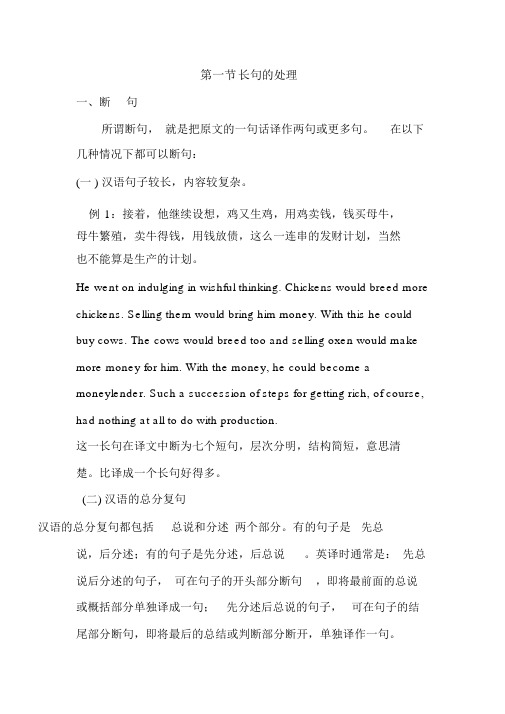
第一节长句的处理一、断句所谓断句,就是把原文的一句话译作两句或更多句。
在以下几种情况下都可以断句:(一 ) 汉语句子较长,内容较复杂。
例 1:接着,他继续设想,鸡又生鸡,用鸡卖钱,钱买母牛,母牛繁殖,卖牛得钱,用钱放债,这么一连串的发财计划,当然也不能算是生产的计划。
He went on indulging in wishful thinking. Chickens would breed more chickens. Selling them would bring him money. With this he couldbuy cows. The cows would breed too and selling oxen would makemore money for him. With the money, he could become amoneylender. Such a succession of steps for getting rich, of course,had nothing at all to do with production.这一长句在译文中断为七个短句,层次分明,结构简短,意思清楚。
比译成一个长句好得多。
(二) 汉语的总分复句汉语的总分复句都包括总说和分述两个部分。
有的句子是先总说,后分述;有的句子是先分述,后总说。
英译时通常是:先总说后分述的句子,可在句子的开头部分断句,即将最前面的总说或概括部分单独译成一句;先分述后总说的句子,可在句子的结尾部分断句,即将最后的总结或判断部分断开,单独译作一句。
下面分别举例说明:1.先总说后分述的总分复句:例 2 这王冕天性聪明,年纪不满二十岁,就把那天文、地理、经史上的大学问,无一不贯通。
Wang Mian had genius. While still in his teens, he mastered the whole field of astronomy, geography, the classics and history.2.先分述后总说的总分复句例 3 另一种态度,学习的时候用脑筋想一下,学那些和我国情况相适合的东西,即吸取对我们有益的经验,我们需要的是这样一种态度。
- 1、下载文档前请自行甄别文档内容的完整性,平台不提供额外的编辑、内容补充、找答案等附加服务。
- 2、"仅部分预览"的文档,不可在线预览部分如存在完整性等问题,可反馈申请退款(可完整预览的文档不适用该条件!)。
- 3、如文档侵犯您的权益,请联系客服反馈,我们会尽快为您处理(人工客服工作时间:9:00-18:30)。
第一节长句的处理
一、断句
所谓断句,就是把原文的一句话译作两句或更多句。
在以下几种情况下都可以断句:
(一) 汉语句子较长,内容较复杂。
例1:接着,他继续设想,鸡又生鸡,用鸡卖钱,钱买母牛,母牛繁殖,卖牛得钱,用钱放债,这么一连串的发财计划,当然也不能算是生产的计划。
He went on indulging in wishful thinking. Chickens would breed more chickens. Selling them would bring him money. With this he could buy cows. The cows would breed too and selling oxen would make more money for him. With the money, he could become a moneylender. Such a succession of steps for getting rich, of course, had nothing at all to do with production.
这一长句在译文中断为七个短句,层次分明,结构简短,意思清楚。
比译成一个长句好得多。
(二) 汉语的总分复句
汉语的总分复句都包括总说和分述两个部分。
有的句子是先总说,后分述;有的句子是先分述,后总说。
英译时通常是:先总说后分述的句子,可在句子的开头部分断句,即将最前面的总说或概括部分单独译成一句;先分述后总说的句子,可在句子的结尾部分断句,即将最后的总结或判断部分断开,单独译作一句。
下面分别举例说明:
1.先总说后分述的总分复句:
例 2 这王冕天性聪明,年纪不满二十岁,就把那天文、地理、经史上的大学问,无一不贯通。
Wang Mian had genius. While still in his teens, he mastered the whole field of astronomy, geography, the classics and history.
2.先分述后总说的总分复句
例 3 另一种态度,学习的时候用脑筋想一下,学那些和我国情况相适合的东西,即吸取对我们有益的经验,我们需要的是这样一种态度。
The other attitude is to use our heads and learn those things which suit our conditions, that is, to absorb whatever experience useful to us. That is the attitude we should adopt.
(三) 汉语的转折复句
句中语气发生了变化,或意思有转折,即前半句说明一方面的情况,后半句说明另一方面的情况,英译时也常常断句。
例 4 我们的人民政府是真正代表人民利益的政府,是为人民服务的政府,但是它同人民群众之间也有一定的矛盾。
Our People’s Government is one that genuinely represents the people’s interests and it is a government that serves the people. Nevertheless, there are still certain contradictions between this government and the people.
(四) 汉语长句的结尾部分是“反问”或“感叹”分句时,英译时一般也可断句。
例如:
例5 年岁不好,柴米又贵,这几件旧衣服和旧家伙,当的当了,卖的卖了,只靠着我替人家做些针线生活寻来的钱,如何供得你读书?
Times are hard, and fuel and rice are expensive. Our old clothes and our few pieces of furniture have been pawned or sold. We have nothing to live on but what I make by my sewing. How can I pay for your schooling?
(五) 为了表达原句的强调语势,英译时也往往采用断句法。
例如:例 6 我们的民族将再也不是一个被人侮辱的民族了,我们已经站起来了。
Ours will no loner be a nation subject to insult and humiliation. We have stood up.
二、区分主从
汉语复句中往往不用关联词,分句之间的逻辑关系在很多情况下主要依靠排列顺序来表示。
凡是为主的分句,即正句,用英语限定式动词结构来表达;从属的分句,即偏句,则可采用各种非限定式动词短语或介词短语来表达,或增加从属关联词或通过各种从句形式来处理。
通常可遵循以下一些规则:
(一) 表示原因或条件的部分,一般应从属于表示结果的部分。
例如:
例 1 王冕见此光景,过意不去,叹了一口气道:“河水北流,天下自此将大乱了。
我还在这里做什么?”
Distressed by this sight,Wang Mian sighed and said, “Now the river has left its course again. This has invariably been a prelude to a period of great confusion. Why should I stay here?”
例 2 错误和挫折教训了我们,使我们比较地聪明起来了,我们的事情就办得比较好一些。
Taught by mistakes and setbacks, we have become wiser and handle our affairs better.
(二) 表示方式或状态的部分,一般应从属于表示行为或动作的部分。
例如:
例3 全国人民紧密团结在党中央周围,朝气蓬勃,奋勇前进。
Rallying closely around the Party Central Committee, the whole people of our country are advancing with vigor and valor.
(三) 表示方法和手段的部分,一般应从属于表示目的的部分。
例如:
例4 我们用自己动手的方法,达到了丰衣足食的目的。
By using our own hands we have attained the objective of ample food and clothing.
(四) 否定或反说部分,一般应从属于肯定或正说部分。
例如:例5 必须有分析有批判地学,不能盲目地学。
We must learn with an analytical and critical eye, not blindly.
练习题
1).有两座压在中国人民头上的大山,一座叫帝国主义,一座叫封建主义。
imperialism, feudalism.
2)应当承认,每个民族都有它的长处,不然它为什么能存在? 为什么能发展? It must be admitted
3). 我们的伟大祖国昂首挺立于世界民族之林,愈来愈成为世界上任何人都不能忽视的巨大力量。
firm and proud
4). 许多人在青年时代并没有多少出众之处,可后来都为国家做出了重大贡献。
